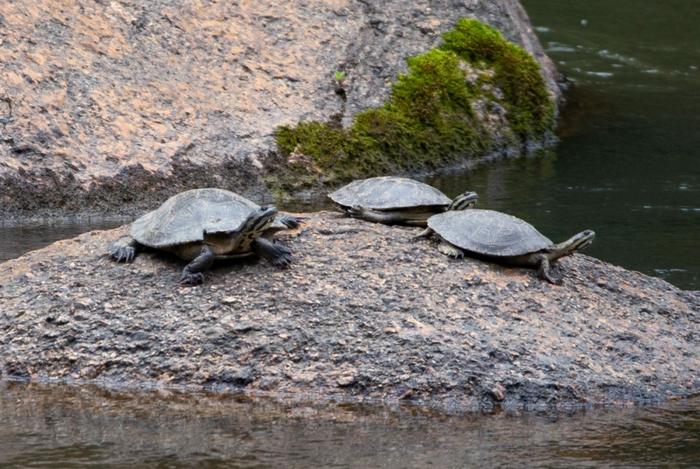A research project supported by FAPESP shows that the construction of new hydroelectric power plants in Brazil’s South region could have an impact on more than 30% of the habitat of Phrynops williamsi, the Williams’ side-necked turtle. The species occurs only in areas of Atlantic Rainforest and Pampa (the grassland biome adjacent to Brazil’s border with Uruguay and Argentina), and is classed as “Vulnerable” (facing a high risk of extinction) by the International Union for Conservation of Nature (IUCN).

Credit: Raphael Zulianello
A research project supported by FAPESP shows that the construction of new hydroelectric power plants in Brazil’s South region could have an impact on more than 30% of the habitat of Phrynops williamsi, the Williams’ side-necked turtle. The species occurs only in areas of Atlantic Rainforest and Pampa (the grassland biome adjacent to Brazil’s border with Uruguay and Argentina), and is classed as “Vulnerable” (facing a high risk of extinction) by the International Union for Conservation of Nature (IUCN).
An article on the study is published in the Journal of Applied Ecology by researchers at institutions in the Brazilian states of Goiás, São Paulo, Rio Grande do Sul, Mato Grosso, Mato Grosso do Sul, Santa Catarina and Paraná.
“Our study is the first to investigate the impacts of hydropower developments on the species in an integrated manner. The results can help plan how to mitigate the impacts of hydroelectric expansion on these freshwater turtles. The same method can be used to study other species threatened by projects in the electricity sector,” André Luis Regolin, a professor and researcher at the Federal University of Goiás (UFG), and first author of the article, told UFG’s press office.
The researchers found that hydropower developments and reservoirs overlap with areas highly suitable for the species corresponding to only 20% of its distribution. The problem will be made worse by small hydropower plants (SHPs) planned for the coming years. The area affected by SHPs will nearly equal that affected by large projects, which currently affect the species most.
Reservoirs flood the animals’ habitats, eliminating the rapids on which they depend, and they try to migrate in search of suitable areas, but are often prevented from doing so by dams. The study shows that highly suitable areas are increasingly rare and less interconnected owing to rising numbers of hydropower developments.
The main method used by the authors entailed correlating data for potential areas of occurrence of the species with georeferenced data for hydropower plants obtained from the National Electricity Agency (ANEEL). The analysis covered 687 hydropower developments all told; 406 had operating power plants, 48 were under construction, and 233 were in the planning stage.
The assessment of the species’ conservation status partially confirmed previous studies, but suggested that the risk of extinction had been underestimated. In Brazil, the species is currently placed in the category “Data Deficient”, meaning there is inadequate information to make an assessment, but the study suggests it is “Vulnerable” owing to the estimated loss of 30% of its distribution range. In Paraguay, Uruguay and Argentina, the species should be classified as “Endangered” because its range is very small, according to the study.
One of the reasons these freshwater turtles have been overlooked in past hydropower development impact assessments is that reptile sampling methods tend to focus on terrestrial species. The researchers hope the study will support decisions on future projects.
“We revealed the overall pattern of the cumulative impacts of hydropower developments on the distribution of the species, which was urgent,” Regolin said. “Our findings are highly relevant to decisions relating to hydroelectric expansion, but much remains to be done to fill the gaps in knowledge about P. williamsi. Investment in cutting-edge research is needed to underpin concrete proposals for its conservation.”
About São Paulo Research Foundation (FAPESP)
The São Paulo Research Foundation (FAPESP) is a public institution with the mission of supporting scientific research in all fields of knowledge by awarding scholarships, fellowships and grants to investigators linked with higher education and research institutions in the State of São Paulo, Brazil. FAPESP is aware that the very best research can only be done by working with the best researchers internationally. Therefore, it has established partnerships with funding agencies, higher education, private companies, and research organizations in other countries known for the quality of their research and has been encouraging scientists funded by its grants to further develop their international collaboration. You can learn more about FAPESP at www.fapesp.br/en and visit FAPESP news agency at www.agencia.fapesp.br/en to keep updated with the latest scientific breakthroughs FAPESP helps achieve through its many programs, awards and research centers. You may also subscribe to FAPESP news agency at http://agencia.fapesp.br/subscribe.
Journal
Journal of Applied Ecology
DOI
10.1111/1365-2664.14436
Article Title
Integrating ecological niche and hydrological connectivity models to assess the impacts of hydropower plants on an endemic and imperilled freshwater turtle
Article Publication Date
25-Jun-2023




